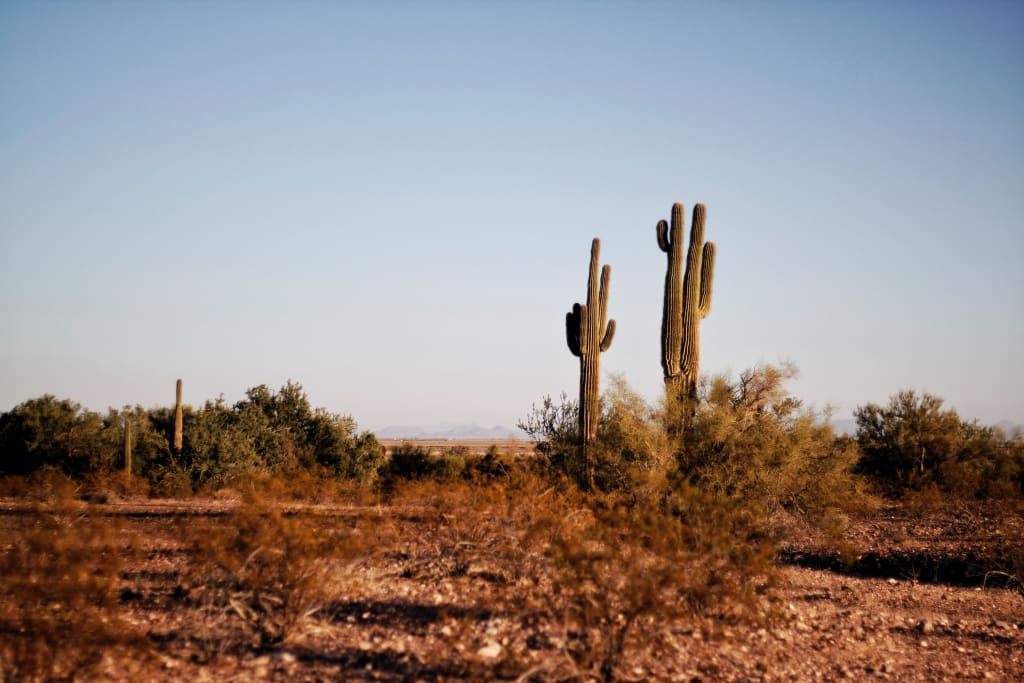
The red mesa –-dust-stamped, sun-smeared–- stretching out untold miles before us, just me and the money in the seat over, the sticky air and the black car like a bug, less than a bug, upon a land still not fully mapped.
The money is in a doctor’s bag which once belonged to my grandfather –-Leslie Walker I— who passed it along to my father –-Leslie Walker II–- who would’ve passed it to me if I’d been born a boy, but he died and I took the bag and now I’m storing the money within. There’s a long silver chain gaped across the leather, keeps catching the sun. Inside, the money mutters to itself: curses, promises of revenge for shoving it in such a stuffy place. I told it I would if it kept on talking like it had been, and, well, what do you think happened? Like my daddy told me: Dirty money doesn’t shut up.
I’ve got an arm out the window and some moseying-along music on the car radio to drown out the money’s murmuring. Cacti off to the west, standing so regal, keep the vista from falling into full flatness. I’ve got to stop every now’n’again for a bearded lizard to waddle across the way. Don’t matter. I’m in no hurry. Not like the desert is going anywhere.
There’s a loud smack of paper on leather as the money throws itself into the confines of its cage, and the bag falls forward, off the front seat and into the leg-space below, its contents spilled on the floor. The money coughs and fans away what dust it kicked up. I look over at it, grinning, bemused.
“You’re really going through with this, huh, you sonofabitch?” it says to me in that tone I hate. I spit over where it lays, and it draws a few bills back. “You’re nasty. Nasty and foolish.”
“Well,” I say, “seems we’re cut from the same.”
We come to a level crossing, the first such intersection of road and railroad in about a hundred miles, a great grey cross of laid out flat on the land, the asphalt frying. Both candy-cane arms of the crossing gate hang down over the road, though the lights ain’t lit and I don’t see any trains a-coming. Only blank desert in both directions. I guess it’s just this heat making even the architecture wilt.
I jerk the car to the right and roll over the tracks, a rough terrain noticeably different from the soft highway that has taken us by Abilene, through Big Spring and Odessa, then out to this ungodly country past Pecos. Had a vulture flying with us part of the way like albatrosses do with ships on the Atlantic. Anyways, the money feels the changing topography and starts yapping again, but just more of the same stuff it can’t keep itself from spewing.
“You know you don’t want to do this! Throwing away all of this? This? After how hard you worked to get it? You’re crazy. Crazy! Aw hell, don’t do this! Reconsider! Please! There’s so much I want to do, I—”
Only thing near me on the dash is that little black notebook of mine, so it’s the notebook I whip down towards the money. “Quit yer hollerin’!” I shout. “We ain’t there yet. Save your pleas.”
We’re back on the road only about a quarter-mile when I hear the hot whoosh of a train screaming by on the tracks behind us. I see it passing in my rearview, a thirty-five-car freight rumbling through the desert, hauling oil, maybe, or cattle. ‘Twas only dumb luck that it missed us. All the desert knows is luck, who has it and who ain’t.
“What’s that sound?” the money cries, frantic. I don’t answer. Better if it don’t know.
*****
If anybody’d’n seen me with the burlap sack over my shoulder, they’d surely have believed me the carrier of a body. After all, what else is there to do in this vastness but bury what things you want forgotten?
But there ain’t nobody for miles out in this land that ain’t got a name, ain’t got a population marker, ain’t hardly even got a coyote prowling around for unlicked bones, such is its magnitude of emptiness. Only baked rocks so brittle you can bite bits off and sand what would char the soles of your feet should you dare prance around barefoot.
The money is restless, knows we’re close. It jiggles around, trying to knock against the back of my knees. I see its logic: maybe I’ll fall and tear a tendon. While I get about to crawling back towards the sack I’d spilled, it can unleash itself, maybe float away in the wind, find the lone living soul out here and hope that such a person might follow a trail of dollars back to its source. Course, you find 20,000 dollars sitting in a bag in the middle of the mesa, you must half-way expect to find a desiccating corpse beside it.
I take the black notebook out from my back pocket, brush the sweat from my eyes and pull my hat brim lower, so I can make out the faint shapes on the pages. I’m looking for a particular array of rock formations: like devil’s horns, with a seven-sided stone in between. I squint at the first drawing, penciled into this notebook some 85-years-ago by my aforementioned grandfather, which is faded some and gnarled on account of the man’s arthritis. My father’s subsequent drawings of the spot are far more helpful. He was a methodical man, placed a whole helluvalotta notation alongside the picture. Marginalia. Instructions on where to turn and after how many paces and what monuments to look out for –I stand now upon a spot he coined avocado rock.
Takes me less than an hour from there to espy the devil’s horns rising up unbidden from the desert. Ain’t no natural formation, seems to me; more like a thing some higher power pulled up from the Earth to denote a spot worth keeping sacred. I stand for a moment just gazing at it. Just as my daddy before me, and his daddy before him, did too.
I trudge on over and find the portended pocket of soft Earth tucked into the seven-sided rock, and I start digging. Just a garden shovel, but which had first alerted the money to trouble.
“Why are you taking a shovel to the bank?” it had asked me.
“Well…cuz we ain’t going to the bank.”
“Where are we going then?”
“Ain’t no concern of yours,” I told it.
“Hell if it ain’t.”
“Keep talkin’ like that, and you’re going in the bag.”
“Hell if I am!” it shouted, all ornery, flapping its bills and chucking itself around the kitchen. But 20,000 dollars thinks it’s much more than it is, and I had it wrapped up and locked away soon enough.
After a bit of digging, metal hits metal, and the money starts shouting.
“Oh come on, man. Have I done anything wrong? Am I myself not innocent? Oh come on. Quit diggin’. Please. Please! Think about what you’re doing. Think of the good I could do! That you could do, with me. But this? This? This is blasphemy! You’re a heathen! Scum! Vermin! The Good Lord will strike thee down just as sure as—”
I kick the bag, and the money inside quiets. I never liked this lot of bills, but, then again, I brought it on myself. Couldn’t get no sleep from the first night we spent together, what with all its talk. Like I said: Dirty money never shuts up.
I open the old lunchbox I pull from the ground, its colors long since seeped into the soil, and spend awhile fingering the knickknacks within. Old photos of my grandfather with his war buddies, and his medal, and my daddy’s medal, and his gold tooth, too. A magnifying glass, a cicada skeleton, the note my daddy’s first wife had written him, which is tattered but still legible.
“Any last words?” I ask the money, which I’ve spread out in stacks upon the red ground.
“Just that you’re a varmint. Vandal. Thief. I never belonged to you anyways! Honest money always ends up in the wrong hands. Better in this box than out there being hoarded by you.”
I whistle, as I would to a horse. “Now, my friend, you are finally talking some sense.”
After I pack the bills in the box and set it all back in the ground, I sit down upon a rock and add my own drawing into the notebook. Three generations of Walkers, sitting just like this, in just this spot, doing just this same task. Hmm, ain’t that just the darndest thing.
I want the notebook’s next recipient to know some things, so I write a bit about what I’d put in the box, and why I had to do what I’d done, and how I wasn’t proud of it, and how this was, in my own way, a kind of atonement.
Once the sun starts setting on the other side of the great rocky cowlick behind me, I help myself up and make back to the car. But I stop and return to the box and dig it out once more, and I hold it there, open in my hands, the box, and the money starts screaming at me –-thinks I’m here to save it, having had a change of heart, and thinks this right up until I put my hand in, fingers wet with spit, take two twenties off the top of the stack, and bury the box back in the Earth.
Gas money.
*****
Some time later, a boy in Cincinnati, whose father brought him north after the split, wakes in the morning to find on the kitchen table a manila envelope bearing his name. His father recognizes my hand-writing but still lets the boy open the package. Inside is a small black notebook, which bears upon its pages the boy’s history, faded but there. And until that book is burned to cinders, that history might yet endure.
Two decades pass when, down on his luck and out of work and on a whim, the boy (now a man) drives many miles south, into the Texan mesa, by Abilene, through Big Spring and Odessa, then out to an ungodly country past Pecos. It’s desert luck he needs, and he gets it twice: once when he parks the car and again when he gets about to searchin’. The landscape opens up for him: a stone described as an avocado still seems so, even after a full score of storm and char. And two devil’s horns just over that ridge.
Bad luck may have drawn him into the desert, but desert luck draws him to the box, and he opens it, gazing at the treasures within. The money is quiet. Not a peep. Dirty money never shuts up, I know, but after all that time, it savors the feeling of clean hands. Those clean hands soon stuff the money into a knapsack, bury the box, draw a picture, and drive on back to Ohio.
About the Creator
Sandy Manmittens
Writer of run-on sentences. Revisionist of said sentences.
Enjoyed the story? Support the Creator.
Subscribe for free to receive all their stories in your feed. You could also pledge your support or give them a one-off tip, letting them know you appreciate their work.






Comments
There are no comments for this story
Be the first to respond and start the conversation.